PPC (Pay-Per-Click)
What is PPC (Pay-Per-Click)?
PPC (Pay-Per-Click) is an online advertising model where advertisers pay a fee each time their ad is clicked. It is a way of buying visits to your site rather than earning them organically. PPC ads can appear on search engines, social media platforms, and other websites. The most common form of PPC is search engine advertising, where advertisers bid on keywords to have their ads displayed in search engine results.
Why is PPC Important?
PPC is important because it provides a cost-effective way to drive targeted traffic to your website and generate leads and sales. Unlike organic traffic, which can take time to build, PPC offers immediate visibility and results. By targeting specific keywords and demographics, advertisers can reach potential customers who are actively searching for or interested in their products or services.
PPC also offers measurable and trackable results, allowing advertisers to analyze the performance of their campaigns and optimize them for better outcomes. With detailed analytics, businesses can understand which ads, keywords, and audiences are driving the most conversions and adjust their strategies accordingly. Additionally, PPC provides flexibility and control over budget and targeting, making it suitable for businesses of all sizes.
Best Practices for PPC Advertising
1. Conduct Keyword Research
Perform thorough keyword research to identify relevant and high-performing keywords for your PPC campaigns. Use tools like Google Keyword Planner, Ahrefs, and SEMrush to find keywords with high search volume and low competition. Targeting the right keywords ensures that your ads reach the right audience.
2. Create Compelling Ad Copy
Write clear, concise, and compelling ad copy that captures attention and encourages clicks. Highlight the benefits of your product or service, use strong calls to action, and include relevant keywords. Effective ad copy improves click-through rates (CTR) and conversions.
3. Use Ad Extensions
Use ad extensions to provide additional information and enhance the visibility of your ads. Ad extensions can include site links, callouts, location information, and more. Using ad extensions improves the ad's relevance and can increase CTR.
4. Set a Realistic Budget
Determine a realistic budget for your PPC campaigns based on your goals and available resources. Monitor your spending and adjust your budget as needed to maximize ROI. Setting a budget helps control costs and ensures that your campaigns remain profitable.
5. Optimize Landing Pages
Ensure that your landing pages are relevant, user-friendly, and optimized for conversions. The landing page should match the ad's message and provide a clear path for users to take the desired action. Optimized landing pages improve conversion rates and overall campaign performance.
6. Implement Negative Keywords
Use negative keywords to prevent your ads from appearing for irrelevant or low-intent searches. Negative keywords help refine your targeting and reduce wasted ad spend. Regularly review and update your negative keyword list to improve campaign efficiency.
7. Monitor and Analyze Performance
Regularly monitor the performance of your PPC campaigns using analytics tools. Track key metrics such as impressions, clicks, CTR, conversion rates, and ROI. Analyzing performance data helps identify areas for improvement and optimize your campaigns for better results.
8. Perform A/B Testing
Conduct A/B testing to compare different ad variations and determine what works best. Test different headlines, ad copy, visuals, and calls to action. A/B testing provides insights into what resonates with your audience and helps improve ad performance.
9. Use Targeted Audiences
Leverage audience targeting options to reach specific demographics, interests, and behaviors. Use remarketing to target users who have previously visited your site or interacted with your brand. Targeted audiences increase the relevance and effectiveness of your ads.
10. Stay Updated with Trends
Stay informed about the latest trends and best practices in PPC advertising. Continuously learn and adapt to changes in algorithms, ad formats, and consumer behavior. Staying updated ensures that your PPC strategies remain effective and competitive.
By following these best practices, you can create and manage successful PPC campaigns that drive targeted traffic, generate leads, and achieve your marketing goals.
For more terms, return to the content marketing glossary and freelance writing glossary.

